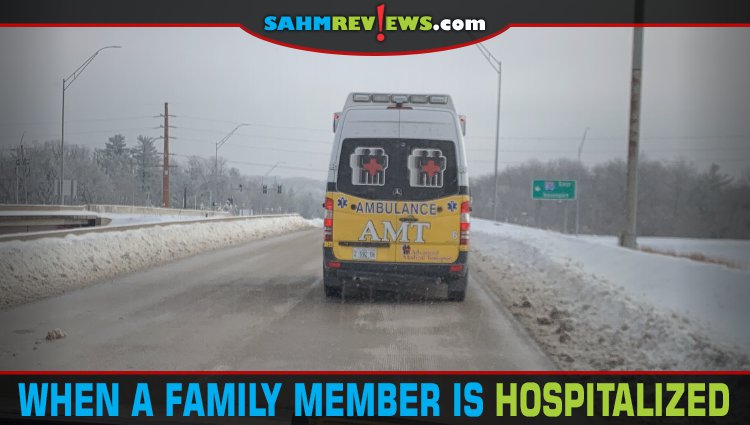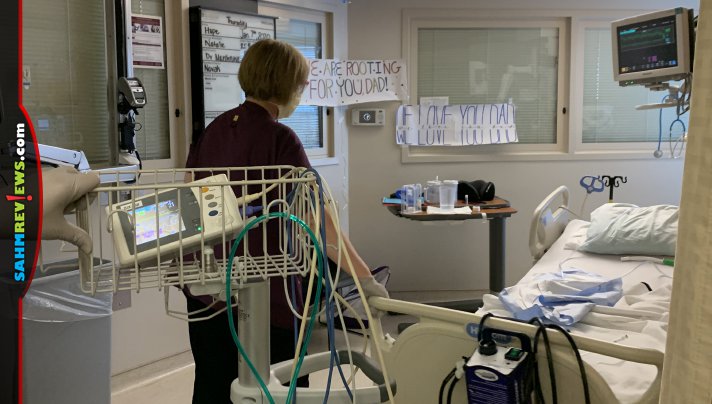10 Things to Do When a Family Member is Hospitalized

Next week is Scott’s birthday and I suspect he will have a newfound appreciation for the day. I certainly will and here’s why…
As you’ve likely noticed, we’ve been away from the site for over a month and a half. While most people were ringing in the new year enjoying the company of family and friends, I was watching Scott struggle with what we thought was a bad case of indigestion or possibly even food poisoning. The vomiting and pain persisted throughout the night and by morning we both realized he needed to go to the emergency room. After initial evaluations, the ER doctor very frankly said to me, “Let’s be honest. He is very, very sick.” It wasn’t indigestion nor food poisoning, but further testing revealed it to be a serious case of pancreatitis that was most likely caused by a gallstone. With kidney failure a result of the pancreatitis, the local hospital made the decision to transfer him to University of Iowa Hospital. It was only the beginning of Scott’s fight for his life. While that may sound dramatic, there’s 100% truth to it. Pancreatitis is no joke and the ramifications of it on the other organs is awful. I had no idea, but learned a lot over the three-week course of Scott’s treatment onsite at the University Hospital. The most important thing I discovered is that we cannot take a single day for granted.
I’m not going to go into the details of what I learned medically because I don’t want someone to land on this article when they make the mistake of using Dr. Google to learn about the pancreatitis diagnosis of a friend or loved one. I’m not even going to discuss procedures on wearing a mask. Instead, I want to offer some tips on what to do when that person is hospitalized because it really is overwhelming. I hope this article also offers some insight into what you can do when someone you know is faced with a similar crisis.
First, I’m going to start with what you SHOULD NOT do. I’m serious here.
Do NOT Google.
When a family member is sent to the hospital, it’s natural to want to learn as much as you can. What better place to turn than to Google, right? Wrong. Each person’s diagnosis has it’s own set of circumstances. A quick search for the basic underlying description of the diagnosis is one thing, but beyond that just stop.
With that out of the way, let’s focus on 10 things you SHOULD do when a family member is hospitalized.
Find out how to communicate with the medical professionals.
While I’m saying not to Google, that doesn’t mean to stay uninformed. In fact, that’s exactly the opposite of what you should do. From day one, ask how to connect with the doctors and nurses and the best time to call. Contact them regularly for details on progress, test results and emotional state.
Document everything.
Keep a journal of notes regarding the conversations with professionals as well as things you’ve witnessed yourself. I called each morning after rounds so I could be mentally prepared when I was there during visiting hours. The conversations, coupled with my notes, gave me an opportunity to ask about things that I noticed were improving – or not.
Be an advocate for the patient.
The patient won’t be able to do many of the things that need to be done so it’s your job to make sure everything stays on track. Follow up if you think someone has dropped the ball. Whether it’s medical records being sent to your primary care physician or the patient not getting assistance with personal care, speak up. Don’t forget to document that too!
Pack a bag for the patient.
The hospital will provide the basic necessities including food, beverages, robe, socks and hygiene products. But depending on whether the patient is awake or not, you’ll want to have other items on hand for them. Phone, iPad, chargers and cables are the most important. But also consider comfort things like a neck pillow and earbuds. They might not need it right away, but when they do it will be there.
Pack a bag for yourself.
In the age of COVID, visiting hours aren’t what they used to be. Both hospitals had very limited hours which meant I needed to be there in advance so I could walk in the minute I was allowed to do so. Even if you plan to drive there and home each day, keep a backpack in the car with medicine, glasses/contact solution, phone cables/chargers, a change of clothes and even a snack. You probably won’t need them, but you’ll want to have these things available in the event there’s a surgery or something that keeps you from returning home when you planned.
Gather moral support for the patient.
Hospitals often have programs that allow patients to receive emails. Find out if the hospital does then share it with family and friends. Being in the hospital can be a very isolating experience, especially with such limited visiting hours. If you have children, encourage them to make posters for the room. Hospitals have rules regarding flowers and balloons, but posters are allowed. Our girls also made a bunch of Post-it notes and I regularly left those for him to find. Originally, I only put them on the bedside tray, but once he was finally on his feet, I put them on the mirror in the bathroom and on the window by the chair he sat in.
Accept help when offered.
Here’s a tough one because it’s hard to admit you’re vulnerable and need help. People want to help so don’t push them away. I had many people ask how they could help and my answer was usually, “Please pray.” In hindsight, I should have said what I really needed. First and foremost, find someone that would be willing to be your coordinator. When someone offers assistance, connect them with that coordinator who can schedule meal deliveries, help with transportation, aid with pets or handle home issues (such as lawn mowing or snow removal).
Coordinate care for kids and/or pets.
You need to be able to stay focused on your ailing family member. Talk to family or neighbors to ensure that kids and pets are taken care of in your absence.
Write thank-you notes.
Not only is it important to be appreciative of the things people do for you, but it’s also very therapeutic to share how much they truly made a difference. Create a master list that includes the person’s name, what they dropped off or took care of, the date received and a date the thank you was mailed. Don’t try to write them all at once, but work on them gradually when you have a few minutes here or there.
Take care of yourself and remain positive.
It’s imperative that you remain positive both for your own well-being but those of your family. Focus on the improvements, no matter how small. You may find it difficult to sleep and eat, but do your best. You need to keep up your strength because you don’t know how long it will be before things get back to normal.
While Scott has been home for almost a month, we’re far from being done with this. It’s been difficult to get a follow-up appointment back in Iowa City and the local surgeon cannot proceed without a specialist involved. It will continue to be a scary (and painful) time until he completely recovers, but we are taking it one day at a time. I’m thankful that he is regaining some strength and sense of humor and look forward to him being healthy again.
Have you ever been faced with this kind of challenge?




Thank you, Nicole! All the best for you guys!
Thank you, Marco. We’re taking it one day at a time.
Thank you for the wonderful advice!
I wish I had a list like this twenty plus years ago when my son was diagnosed with cancer. You nailed it. I hope Scott has a full recovery.
Thank you, Lee. As you know, it’s a difficult road to travel. I hope you had the support you needed when your son was diagnosed.
i hate to be the “doom and gloom” guy, but something you left out was the medical insurance side of things. if not followed CAREFULLY, “misunderstandings” can break a family financially.
Also, if this does happen on the cusp of the year, or if it is known (g*d forbid) to be a long term issue, adjusting the FSA, where possible, can save money on making some of the expenses “tax exempt.
Thank you for that feedback and tip about the FSA, Michael. You are absolutely correct that the insurance side of things is another absolute mess to deal with.
I’m so very sorry to hear that you’re going through this. Praying for you both now!
Thank you so much, Ashley. It’s been quite a struggle, but the support have received from friends, family and community has been so appreciated!
Thank you.
Fortunately, I have not had this challenging situation but I can imagine how difficult it would be. These helpful suggestions would at least reduce some of the anxiety.
It is really hard for me to read about people having hard times and are sick!! I have had so many loved ones die that I swear my heart could have broken in half!! BUT I believe in Jesus! Prayer works!! Believing works! Having faith that He will take care of the desires of your heart, but in His time!! Throw your cares and worry to Jesus!! He also takes care of finances! Pray with your husband and girls! Give him hope that only God can give; in Jesus name!! I will add your family to my prayers today!! Amen
Great advice!
Great info and tips!
Best thing to do is stay home, prepare for them coming home. Patients get better care when you are not there! And, hospitals are a breeding ground for EVERYTHING!
A very good list – might add take change of clothes for yourself and be sure to bring any meds you need to take daily so if you get stuck waiting for over 24 hours you don’t end up as a patient also! Keep a go bag packed at all times for those just in case issues.
good info
These are good tips. My son has to go to hospital from time to time and these help
This is very good info and tips. Wish I had it when my brother passed in 2005 of Cystic Fibrosis.
Thanks for the info
Tes i have and this us real good advice .
Great advice! It’s important to be an advocate for a sick elderly family member.
Great tips. I recently had a family member in the hospital. I make sure to bring cash for eating, change of clothes and a blanket.
Thanks for the tips. Sending thoughts and prayers to you both.
Useful Info
It is really difficult to have a family member hospitalized. I have been through this, and also have been on the other side of this as a resident physician. Good tips
Thank you very much for sharing Nicole. I’ve had family in hospice for short term stays and for end-of-life treatment, and it’s absolutely hard seeing someone you love in any form if discomfort or pain. Thankfully it’s been many years since such a time. This list will certainly be handy to run through in future – thank you!!
I have not had to go through this, but it is good information to have
great ideas
This is good advice. I haven’t dealt with this myself but have known several people over the past couple of years who have.
I was in the hospital for a month and my family helped so much
I’ve been pretty fortunate that I haven’t had to deal with any major hospitalizations.
I hope Scott is feeling like his usual self now. I’m an RN and as you now know-pancreatitis is very serious! I too have been through an experience like yours. My husband had a motorcycle accident 3 years ago. His spine was fractured is 5 places, his collar bone was fractured along with 5 ribs, fractured femur, etc. Thank God he’s almost as good as new! Your tips are spot-on! Thank you for posting this information.
i stayed for few months with my ex husband it all started with what he thought was hemmorhoids well it was not it was rectal cancer we found it out after he had a colonoscopy so we camped out at the hosp a lot for few months. once for bag to be put on then 8 days later emergency surgery from the first surgery something came loose n he was septic so they had to fix that n as he recooped from that in the icu he began slurring speech and having severe high blood pressure then they done a scan of his head n found out he had a big brain tumor it wasnt cancer but after getting healed from the colon surgeries he had to return n have a big brain tumor took out he was having bad seizures from the tumor in his head and had to take seizer meds til the surgery. so yah i know all bout that hosp stay stuff n it sucks its boring n tiresome on patient and family n friends my mom would come give me breaks to leave the room from time to time n she also cared for my dogs while i was there
I have never had to deal with a situation like this before. Very useful info.
i was the one in the hospital for four months. This is great advice for your caregiver!
I was hospitalized for colon cancer. Experiencing hospitalization for the first time was a really challenging experience. I was fortunate that I had great physicians and hospital. It certainly is a learning experience. It is best to be prepared. I wasn’t. Your blog was very informative.
I have had family members hospitalized and it is indeed emotionally challenging. Thanks for this good advice.
A family member has been hospitalized, but I wasn’t the one making arrangements.
This is such good advice. Dealing with long term hospitalization is so draining.